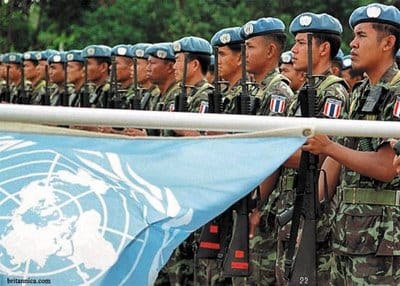\If You're Not Part of the Solution...\: UN Peacekeeping Needs Overhaul


It is often said that peacekeeping is a growth industry. However, this should never preclude the United Nations from finding a better way to do business. Since 1948, the UN has established 64 peacekeeping operations with undoubtedly more planned for the future, as nation-states such as Sudan convulse in and out of civil war.
Currently, the UN Department of Peacekeeping Operations (DPKO) is supporting 14 peacekeeping operations at a cost of nearly $8 billion a year. Some UN peacekeeping missions have been in existence for over 60 years. Others, which have been in existence for shorter periods of time, still seem to have become locked in place. Even these static missions still draw significantly on UN and Member State resources.
The time has come to reexamine how UN peacekeeping is conducted. A full and comprehensive review of UN peacekeeping should be initiated, with a particular emphasis on moving stalemated or static post-conflict situations toward resolution. If a peacekeeping operation does not appear to be advancing resolution of the issues, then the UN needs to explore alternatives and at least consider scaling back or otherwise restructuring those missions. In the interest of addressing both the underlying conflicts and maximizing the effectiveness of limited resources, the UN needs to be willing to examine critically whether some of these peacekeeping missions may actually be prolonging stalemates by not sufficiently forcing the parties to resolve their differences through political or diplomatic means. If it is determined that missions are contributing to stalemate, the UN needs to look for ways to invigorate the peace process or to begin moving these peacekeeping operations toward drawdown.
Criteria for identifying those missions ripe for innovative action should be established, in order to move ahead toward a final peace. Just as DPKO has worked to identify common elements of successful peacekeeping missions for possible replication, the UN should also work to develop means to identify the common elements of missions that have resulted in stalemate to help them avoid repetition of past mistakes. As soon as possible after the active phase of conflict has been brought under control by peacekeepers, efforts must be undertaken to distinguish between those remaining tasks that are appropriate
for the DPKO and those more appropriately handled by other actors including other specialized UN agencies, regional or sub-regional organizations, or bilateral partners. Consequently, some missions will and should have, limited goals and correspondingly limited size and resources. UN peacekeeping operations should never be allowed to crowd out or substitute for a full and participatory political process aimed at complete conflict resolution leading to long-term and sustainable peace, development, and security.
Today's increasingly multi-dimensional peacekeeping operations are far too expensive in both human and financial terms to undertake without a clear exit strategy in place from the beginning. Peacekeeping is far too critical to ever be allowed to stagnate. The UN must be fluid, resourceful, and innovative in how they do business or risk becoming irrelevant.


